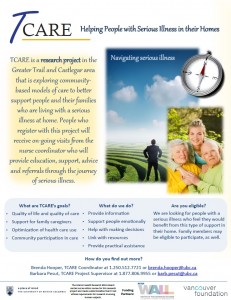 TCARE: Trail-Castlegar Augmented Response:
TCARE: Trail-Castlegar Augmented Response:
Enhancing Supportive Services for Persons and Families Living with Life-Limiting Chronic Illness
What is TCARE?
TCARE was a rural supportive service in the Trail and Castlegar area of BC that provided regular visits in the home by a nurse navigator. The nurse navigator provided support, teaching, care planning, referral and symptom management. The service provided on-call support 24/7. A physician and nurse practitioner provided expert consultation. This community-based research project was led by Dr. Barbara Pesut and Brenda Hooper, who is based in Rossland BC. This service has now evolved into NCARE.
Why was TCARE important?
Rural citizens living with complex chronic illness have limited access to services and expertise. The goal of the TCARE service was to enhance services received by those people and their families living with life-limiting chronic illness in rural areas through a continuous expert source of support in the community. The nurse coordinator worked in cooperation with patients and family caregivers to identify and meet needs across all transitions in care. This is turn allowed them to stay in their homes and communities for as long as possible. Program participants also provided important information on their quality of life, quality of care, and their use of healthcare services, thus making an important contribution to our knowledge about dying in rural areas.
Academic researchers and many people from the Trail and Castlegar area worked together as part of TCARE. The academic researchers included Dr. Richard Sawatzky, an expert in measuring quality of life and outcomes from patients; Dr. Carole Robinson, an expert in palliative care and family caregiving; and Dr. Joan Bottorff, a senior scholar and expert in psychosocial cancer care. The community-based TCARE team members included doctors, social workers, registered nurses, nurse practitioners, funeral directors, healthcare administrators, hospice personnel, clergy, pharmacists, political and cultural representatives and family members who have cared for a loved one while they were dying.
Project Outcomes
What we learned:
- Older adults living in the home with chronic illness have high needs related to the management of their disease and psychological support.
- Quality of life for these individuals is often low and varies significantly over time.
- Common symptoms include pain, fatigue, constipation, breathlessness and mobility issues.
- Family members have needs for more information about the illness and how to be helpful.
- Individuals are not aware of the resources available to them in their community.
- Regular assessment and intervention by a nurse in the home can help to meet the needs of those living with serious chronic illness and provide much needed support. This reduces the burden of chronic illness and contributes to satisfaction with care.
Who funded TCARE?

